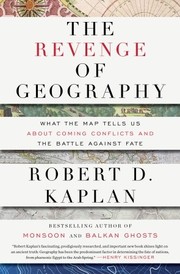Check nearby libraries
Buy this book

Kaplan is a realist. This book is about the physical facts of the world we live on and what those facts mean for cultures and nations. Take for example, the two oceans that insulate the isolationist United States from any credible threats and compare this with the non-existence of any mountains or other barriers around Russia that make its’ land easy to invade and the Russians perennially insecure.
Just as a child growing up is influenced in his development by local immediate factors like the composition of his family and his neighborhood; cultures exist in the context of their interaction with the geographical surroundings and their cultural neighbors.
America is the product of its European and specifically British ‘parents’. With coastlines on two oceans and abundant natural harbors on both coasts, America could hardly have done otherwise than become a sea power. Given our abundance of resources to export, it simply was in our national interest to be focused on maritime trade and the protection of the same.
Contrast this with Russia, which is not a sea power and can hardly become one, no matter how much it wishes to do so. Russia is almost completely cut off from the sea lanes by ice to the north and the expanse of South Asian nations in the other direction. Even Vladivostok, which does sit on the Pacific coast, is not as useful as it may seem as it sits thousands of miles away from 90% of Russia’s population. Distance matters as much as elevation and climate.
Difficult climates like the Russian steppes, Kaplan says, lead to more centralized authority – because that is what works for the survival of the nation. Humans have an appetite for power, but their environment shapes how easy or difficult it is to acquire it.
Kaplan applies these kinds of lessons from geography to all the world’s inhabited regions, looking for the physical factors that have shaped and continue to shape the life of the peoples & nations. For example, the Asiatic steppes produced nomadic horse clans because nothing else made sense there – poor soil, few rivers to use for irrigation or transport, little timber to build homes all point away from sedentary agriculture, and towards a mobile culture that raids outward to acquire the things it needs. The solitary homestead of the American Midwest could not have survived there, the geography just won't allow it.
However, Kaplan is not a determinist; geography is not fate. Persons and nations can choose how they will respond to the world, but they will be influenced by geography whether they realize it or not. What your piece of the globe looks like tells us something important about you and the savvy observer will not let the modern talk of ‘One World’ obscure the enduring realities of geography.
Check nearby libraries
Buy this book

Previews available in: English
Showing 1 featured edition. View all 1 editions?
| Edition | Availability |
|---|---|
|
1
The revenge of geography: what the map tells us about coming conflicts and the battle against fate
2012, Random House
Hardcover
in English
- 1st ed.
1400069831 9781400069835
|
aaaa
Libraries near you:
WorldCat
|
Book Details
Published in
New York
Table of Contents
Edition Notes
Includes bibliographical references and index.
Classifications
The Physical Object
ID Numbers
Community Reviews (0)
Feedback?| August 6, 2021 | Edited by New York Times Bestsellers Bot | Add NYT bestseller tag |
| July 18, 2019 | Edited by MARC Bot | import existing book |
| May 13, 2019 | Edited by MARC Bot | import existing book |
| November 4, 2013 | Edited by Bob Weaver | Edited without comment. |
| January 25, 2012 | Created by LC Bot | import new book |










